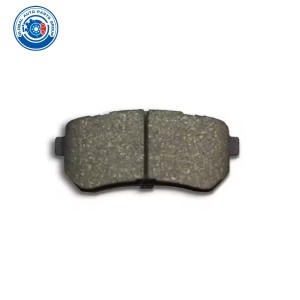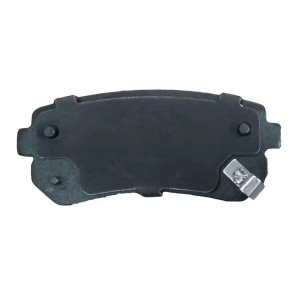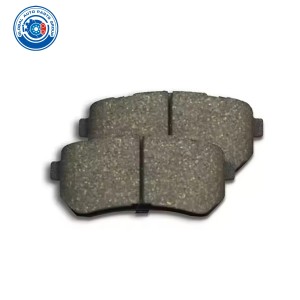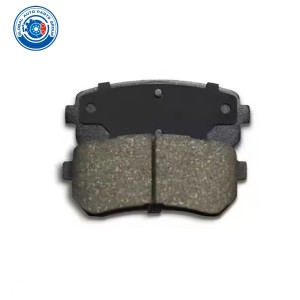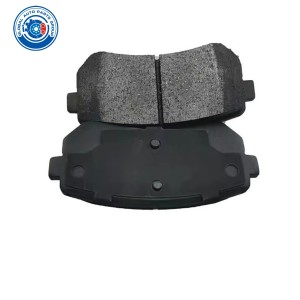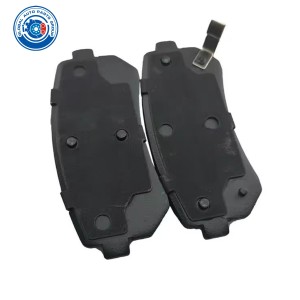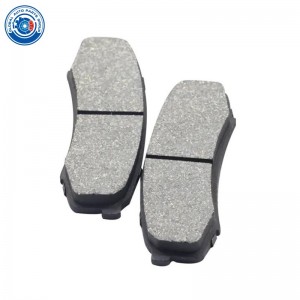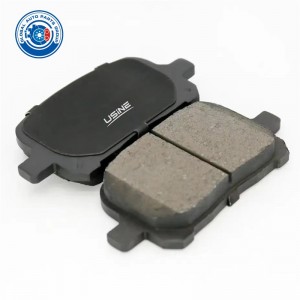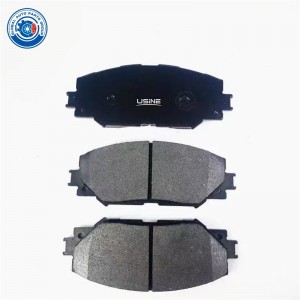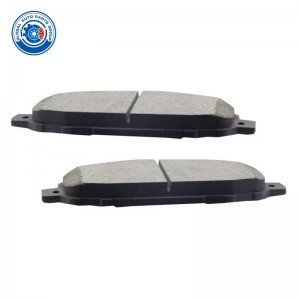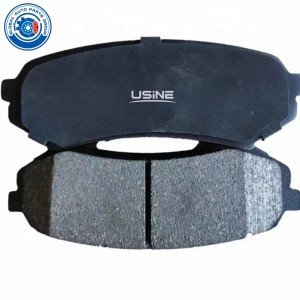D1157
Method 1: Look at the thickness
The thickness of a new brake pad is generally about 1.5cm, and the thickness will gradually become thinner with continuous friction in use. Professional technicians suggest that when the naked eye observation brake pad thickness has only left the original 1/3 thickness (about 0.5cm), the owner should increase the frequency of self-test, ready to replace. Of course, individual models due to wheel design reasons, do not have the conditions to see the naked eye, need to remove the tire to complete.
Method 2: Listen to the sound
If the brake is accompanied by the sound of "iron rubbing iron" at the same time (it may also be the role of the brake pad at the beginning of the installation), the brake pad must be replaced immediately. Because the limit mark on both sides of the brake pad has directly rubbed the brake disc, it proves that the brake pad has exceeded the limit. In this case, in the replacement of brake pads at the same time with the brake disc inspection, this sound often occurs when the brake disc has been damaged, even if the replacement of new brake pads still can not eliminate the sound, serious need to replace the brake disc.
Method 3: Feel Strength
If the brake feels very difficult, it may be that the brake pad has basically lost friction, and it must be replaced at this time, otherwise it will cause a serious accident.
Brake pads can wear out too quickly for a variety of reasons. Here are some common causes that can cause rapid wear of brake pads:
Driving habits: Intense driving habits, such as frequent sudden braking, long-term high-speed driving, etc., will lead to increased brake pad wear. Unreasonable driving habits will increase the friction between the brake pad and the brake disc, accelerating wear
Road conditions: driving in poor road conditions, such as mountainous areas, sandy roads, etc., will increase the wear of brake pads. This is because brake pads need to be used more frequently in these conditions to keep the vehicle safe.
Brake system failure: The failure of the brake system, such as the uneven brake disc, brake caliper failure, brake fluid leakage, etc., may lead to abnormal contact between the brake pad and the brake disc, accelerating the wear of the brake pad.
Low quality brake pads: The use of low quality brake pads may lead to the material is not wear-resistant or the braking effect is not good, thus accelerating wear.
Improper installation of brake pads: incorrect installation of brake pads, such as incorrect application of anti-noise glue on the back of brake pads, incorrect installation of anti-noise pads of brake pads, etc., may lead to abnormal contact between brake pads and brake discs, accelerating wear.
If the problem of brake pads wearing too fast still exists, drive to the repair shop for maintenance to determine if there are other problems and take appropriate measures to solve them.
1, this is often caused by brake pads or brake disc deformation. It is related to material, processing accuracy and heat deformation, including: thickness difference of brake disc, roundness of brake drum, uneven wear, heat deformation, heat spots and so on.
Treatment: Check and replace the brake disc.
2. The vibration frequency generated by the brake pads during braking resonates with the suspension system. Treatment: Do brake system maintenance.
3. The friction coefficient of brake pads is unstable and high.
Treatment: Stop, self-check whether the brake pad is working normally, whether there is water on the brake disc, etc., the insurance method is to find a repair shop to check, because it may also be the brake caliper is not properly positioned or the brake oil pressure is too low.
Under normal circumstances, the new brake pads need to be run in 200 kilometers to achieve the best braking effect, therefore, it is generally recommended that the vehicle that has just replaced the new brake pads must be driven carefully. Under normal driving conditions, the brake pads should be checked every 5000 kilometers, the content not only includes the thickness, but also check the wear state of the brake pads, such as whether the degree of wear on both sides is the same, whether the return is free, etc., and the abnormal situation must be dealt with immediately. About how the new brake pads fit in.
| Hyundai Accent hatchback (MC) 2005/11-2010/11 | Sonata sedan 2.0 | CEE’D hatchback 1.6 | CEE’D station wagon 2.0 | Kia Pride (DA) 1990/01-2011/12 | Kia REO II sedan 2005/03- |
| Accent hatchback (MC) 1.4 GL | Sonata sedan 2.4 | CEE’D hatchback 1.6 | CEE’D station wagon 2.0 CRDi 140 | Pride hatchback/hatchback (DA) 1.4 LX | Ruio II sedan 1.4 16V |
| Accent hatchback (MC) 1.5 CRDi GLS | Beijing Hyundai Accent 2006/02-2013/12 | CEE’D hatchback 1.6 CRDi 115 | Kia K3 II (TD) 2009/01- | Kia PRO CEE’D HATCHBACK 2008/02-2013/02 | The second generation of the Ruio sedan 1.5 CRDi |
| Accent hatchback (MC) 1.6 GLS | Accent 1.4 | CEE’D hatchback 1.6 CRDi 128 | K3 II (TD) 1.6 | PRO CEE’D HATCHBACK 1.4 | The second generation of the Ruio sedan 1.5 CRDi |
| HYUNDAI Accent Saloon (MC) 2005/11-2010/11 | Accent 1.6 | CEE’D hatchback 1.6 CRDi 90 | K3 II (TD) 1.6 | PRO CEE’D HATCHBACK 1.4 | Ruio II sedan 1.6 16V |
| Accent sedan (MC) 1.4 GL | Beijing Hyundai Yuedong 2008/04- | CEE’D hatchback 1.6 CVVT | K3 Second Generation (TD) 1.6 CVVT | PRO CEE’D HATCHBACK 1.4 CVVT | Kia Speedway Coupe 2010/01- |
| Accent sedan (MC) 1.5 CRDi GLS | Yuedong 1.6 | CEE’D hatchback 2.0 | K3 II (TD) 2.0 | PRO CEE’D HATCHBACK 1.6 | Speedway coupe 1.6 T-GDI |
| Hyundai i30 hatchback 2007/10-2011/11 | Yuedong 1.6 | CEE’D hatchback 2.0 CRDi | K3 II (TD) 2.0 | PRO CEE’D HATCHBACK 1.6 | Speedway Coupe 2.0 |
| i30 hatchback/hatchback 1.6 | Yuedong 1.8 | CEE’D hatchback 2.0 CRDi 140 | Kia K3 hatchback (TD) 2009/01- | PRO CEE’D HATCHBACK 1.6 CRDi 115 | Kia Sportage SUV (JE_) 2004/09- |
| i30 hatchback/hatchback 2.0 | Beijing Hyundai i30 2009/07-2014/12 | Kia CEE’D station wagon 2007/07-2012/12 | K3 hatchback (TD) 2.0 | PRO CEE’D HATCHBACK 1.6 CRDi 128 | Sportage SUV (JE_) 2.0 16V 4WD |
| i30 (hatchback/hatchback) 2.0 CRDi | i30 1.6 | CEE’D station wagon 1.4 | Kia CERATO KOUP (YD) 2013/12- | PRO CEE’D HATCHBACK 1.6 CRDi 90 | Sportage SUV (JE_) 2.0 CRDi |
| Hyundai ix35 (LM, EL, ELH) 2009/08- | i30 2.0 | CEE’D station wagon 1.4 | CERATO KOUP (YD) 2.0 MPi | PRO CEE’D HATCHBACK 1.6 CVVT | Sportage SUV (JE_) 2.0 CRDi |
| ix35 (LM, EL, ELH) 1.6 | Kia CEE’D (JD) 2012/05- | CEE’D station wagon 1.4 CVVT | Kia K3 2012/09- | PRO CEE’D HATCHBACK 2.0 | Sportage SUV (JE_) 2.0 CRDi 4WD |
| ix35 (LM, EL, ELH) 1.7 CRDi | CEE’D (JD) 1.6 CRDi 115 | CEE’D station wagon 1.6 | K3 2.0 MPi | PRO CEE’D HATCHBACK 2.0 CRDi 140 | Sportage SUV (JE_) 2.0 CRDi 4WD |
| ix35 (LM, EL, ELH) 2.0 | CEE’D (JD) 1.6 CRDi 90 | CEE’D station wagon 1.6 | Kia PICANTO (TA) 2011/05- | PRO CEE’D HATCHBACK 2.0 LPG | Sportage SUV (JE_) 2.0 i 16V |
| ix35 (LM, EL, ELH) 2.0 | Kia CEE’D hatchback 2006/12-2012/12 | CEE’D station wagon 1.6 | PICANTO (TA) 1.0 | Kia Rio-II hatchback 2005/03- | Dongfeng Yueda Kia Freddy 2009/06-2017/11 |
| ix35 (LM, EL, ELH) 2.0 CRDi | CEE’D hatchback 1.4 | CEE’D station wagon 1.6 CRDi 115 | PICANTO (TA) 1.0 Bi-Fuel | The Ryo II hatchback and hatchback 1.4 16V | Freddy 1.6 |
| ix35 (LM, EL, ELH) 2.0 CRDi | CEE’D hatchback 1.4 | CEE’D station wagon 1.6 CRDi 128 | PICANTO (TA) 1.0 LPG | The second generation (RYU) hatchback 1.5 CRDi | Freddy 2.0 |
| Hyundai Sonata (NF) 2004/12-2012/11 | CEE’D hatchback 1.4 CVVT | CEE’D station wagon 1.6 CRDi 90 | PICANTO (TA) 1.2 | The second generation (RYU) hatchback 1.5 CRDi | Dongfeng Yueda Kia Ruio 2007/01-2014/12 |
| Sonata sedan (NF) 2.4 | CEE’D hatchback 1.6 | CEE’D station wagon 1.6 CVVT | PICANTO (TA) 1.2 | The Rio-II hatchback 1.6 CVVT | Reo 1.6 |
| Hyundai Sonata sedan 2009/01-2015/12 |
| 13.0460-5780.2 | D1157-8267 | 58302-00A00 | 58302-1GA00 | 2432001 | 583021GA00 |
| 572590B | 181712 | 13046057802 | 58302-1HA00 | 2432004 | 583021HA00 |
| 0 986 TB2 975 | 5725901 | 0986TB2975 | 58302-1HA10 | GDB3421 | 583021HA10 |
| 0 986 TB3 044 | 5725901C | 0986TB3044 | 58302-1XA30 | GDB3451 | 583021XA30 |
| P 30 025 | 05P1344 | P30025 | 58302-3RA00 | P13093.02 | 583023RA00 |
| FDB1956 | MDB2734 | 8267D1157 | T1592 | 24320 | 120902 |
| FSL1956 | D11195M | D11578267 | 1209.02 | 24321 | 2120902 |
| 8267-D1157 | CD8394M | 5830200A00 | 21209.02 | 24322 | P1309302 |
| D1157 | FD7290A | 58302-0ZA00 | SP1187 | 583020ZA00 |




